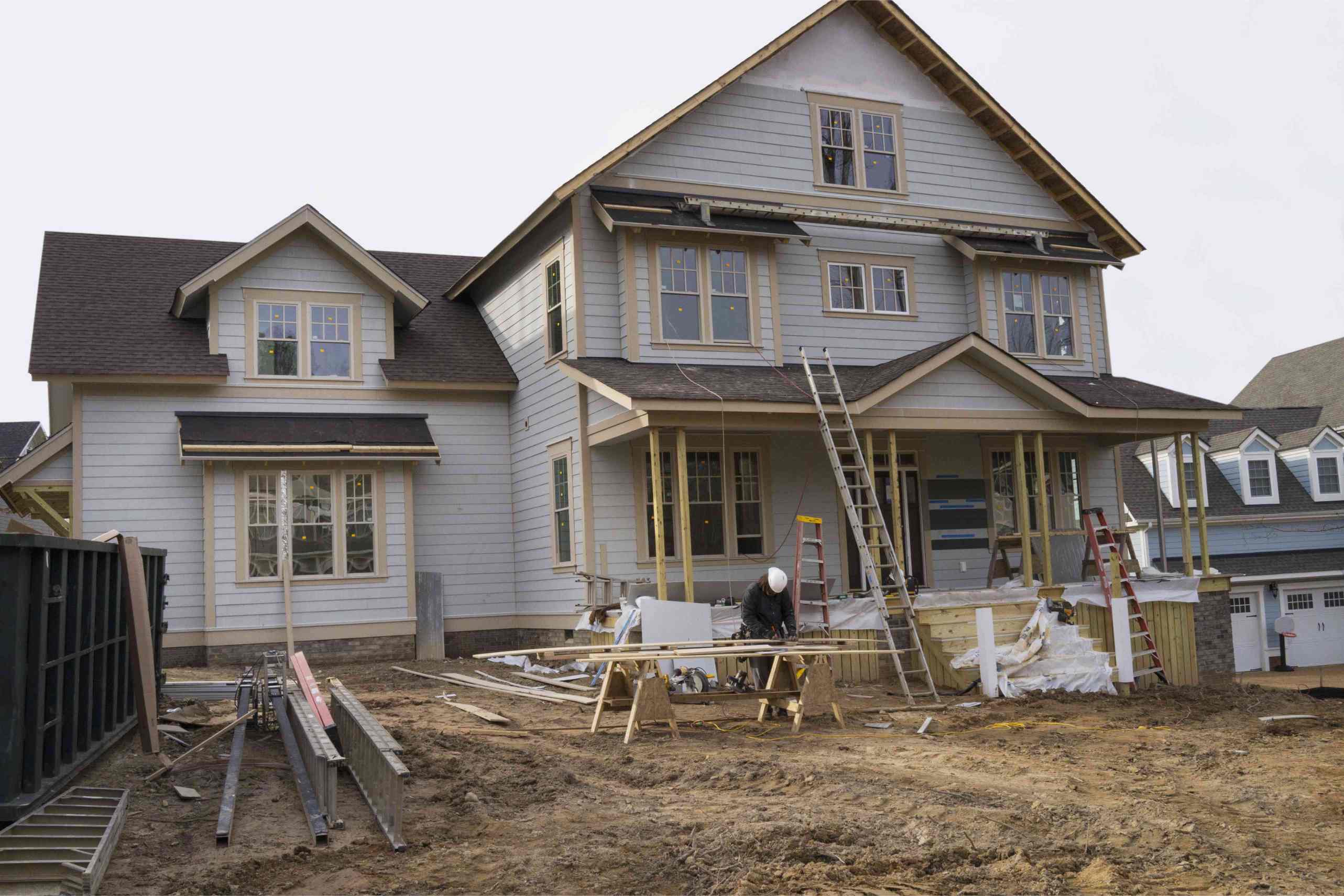Home>diy>Home Improvement>How To Start A Home Renovation Business


Home Improvement
How To Start A Home Renovation Business
Modified: January 6, 2024
Learn the essential steps on how to start a successful home renovation business. From finding clients to managing projects, get expert tips and insights in this comprehensive guide.
(Many of the links in this article redirect to a specific reviewed product. Your purchase of these products through affiliate links helps to generate commission for Storables.com, at no extra cost. Learn more)
Introduction
Welcome to the exciting world of home renovation! If you have a passion for transforming spaces and a knack for design, starting your own home renovation business can be a fulfilling and profitable venture. Whether you’re a seasoned professional in the home improvement industry or a novice looking to enter this thriving market, this article will guide you through the essential steps needed to start and grow your home renovation business.
Home renovation is a booming industry, driven by homeowners’ desire to enhance the functionality, beauty, and value of their properties. From kitchen remodels to bathroom renovations, basement refinishing to whole-house makeovers, there is no shortage of opportunities to showcase your skills and creativity.
However, before you jump in and start swinging hammers, it’s crucial to lay a solid foundation for your business. Planning, research, and careful consideration of legal and financial aspects are paramount to your success in this competitive market. In this article, we will walk you through each step of setting up your home renovation business, providing you with valuable insights and practical tips to help you kick-start your entrepreneurial journey.
By the end of this guide, you will have a clear understanding of how to research and plan your business, create a comprehensive business plan, navigate legal requirements, secure financing, set up your office and equipment, develop effective marketing strategies, establish a strong network of suppliers and contractors, hire and train employees, manage projects and budgets, and deliver excellent customer service.
While the road to building a successful home renovation business may have its challenges, the rewards are well worth it. Not only will you have the opportunity to turn your passion for home improvement into a thriving enterprise, but you will also have the satisfaction of helping homeowners bring their dreams to life. So, let’s dive in and explore the exciting world of starting a home renovation business!
Key Takeaways:
- Starting a home renovation business requires thorough research, strategic planning, legal compliance, and effective marketing. Providing quality customer service and managing projects efficiently are essential for long-term success.
- Building a strong network of suppliers and contractors, hiring and training skilled employees, and securing financing are crucial steps in establishing and growing a successful home renovation business.
Read more: How To Start A Home Renovation Business
Step 1: Research and Planning
Before diving headfirst into starting your home renovation business, it’s essential to conduct thorough research and create a solid plan. This step will lay the groundwork for your business and help you make informed decisions moving forward.
Firstly, research the home renovation market in your area. Understand the demand for renovation services, identify your target audience, and assess the competition. Consider the types of projects that are in high demand and the specific niches you can specialize in to set yourself apart from other contractors.
Once you have a clear understanding of the market, it’s time to define your business goals and objectives. Determine what sets your business apart from the rest and what value you can provide to your clients. Having a unique selling proposition will help you attract customers and stand out in the crowded home renovation industry.
Next, assess your skills and resources. Take an inventory of your expertise, experience, and any certifications or licenses you may need to operate your business legally. Evaluate the tools and equipment you already have and identify any additional resources you may need to invest in.
Market research should also include analyzing pricing strategies. Get a sense of the prevailing market rates for various types of renovation projects. This will help you develop competitive pricing that reflects the value you offer while remaining attractive to potential customers.
Furthermore, business planning is crucial for understanding the financial feasibility of your venture. Create a detailed business plan that outlines your objectives, target market, marketing strategies, pricing structure, and financial projections. A business plan serves as your roadmap and helps you set realistic goals and track your progress along the way.
During the planning stage, consider the legal and insurance requirements for operating a home renovation business. Check with your local government to understand the necessary permits, licenses, and insurance coverage you’ll need to comply with. It’s essential to ensure that you have all the legal aspects in order to protect yourself, your clients, and your business.
Lastly, take the time to establish a strong support network. Connect with industry professionals, such as architects, interior designers, and suppliers, who can provide valuable insights and potential collaboration opportunities. Join local business organizations and attend networking events to expand your connections and gather valuable advice from seasoned entrepreneurs.
By conducting thorough research and crafting a comprehensive plan, you’ll set the stage for a successful home renovation business. With a clear understanding of the market, achievable goals, and a solid business plan in place, you’ll be ready to move on to the next steps of starting your business.
Step 2: Creating a Business Plan
Creating a business plan is a crucial step in starting a home renovation business. It serves as a roadmap for your venture, helping you define your goals, outline your strategies, and assess the financial feasibility of your business.
Start by defining your business objectives. What do you aim to achieve with your home renovation business? Are you looking to specialize in kitchen remodels, bathroom renovations, or full-house makeovers? Define your target market and the specific services you plan to offer. Having a clear vision of your business will help guide your decisions and focus your efforts.
Next, conduct a thorough analysis of your target market. Identify your ideal customers and their needs. Understand their preferences, demographics, and purchasing behavior. This research will help you tailor your services and marketing strategies to appeal to your target audience.
Once you have a clear understanding of your market, outline your marketing and sales strategies. How do you plan to attract customers and promote your services? Consider online marketing channels such as search engine optimization (SEO), social media marketing, and pay-per-click (PPC) advertising. Explore traditional marketing methods like print advertising, direct mail campaigns, and local community outreach.
As part of your business plan, it’s essential to establish a pricing structure that is competitive yet profitable. Research the market rates for different types of renovation projects and consider factors such as labor costs, material expenses, and overhead. Determine your pricing strategy, whether it’s based on hourly rates, fixed project fees, or a combination of both.
In addition to marketing and pricing, your business plan should outline your financial projections. Estimate your startup costs, including equipment, licensing fees, insurance, and initial marketing expenses. Create a projection of your monthly cash flow, taking into account income from projects and ongoing expenses. This financial analysis will help you understand your profitability and plan for future growth.
While creating a business plan may seem daunting, there are resources available to assist you. Online templates can provide a framework to structure your plan, ensuring you cover all the essential elements. Additionally, consider seeking guidance from a business advisor or mentor who can provide valuable insights and help refine your plan.
Remember, a well-crafted business plan is not set in stone. It should be a dynamic document that can be updated and adjusted as your business grows and evolves. Regularly review and revise your plan to keep up with changing market trends and to evaluate the effectiveness of your strategies.
By creating a comprehensive business plan, you are setting yourself up for success. It will not only serve as a guide for your business operations but also be a valuable tool to secure financing, attract potential partners or investors, and communicate your vision to stakeholders.
Step 3: Legal Considerations
When starting a home renovation business, ensuring compliance with legal requirements is crucial. Understanding the legal considerations and taking the necessary steps to establish your business properly will protect both you and your clients, while also giving your venture credibility and professionalism.
First and foremost, check the local and state regulations for operating a home renovation business. Find out if any permits or licenses are required to operate legally in your area. Consult with the appropriate government agencies or consult an attorney to ensure you have all the necessary paperwork in order.
In addition to obtaining the required permits and licenses, it’s essential to register your business. Decide on the legal structure of your company, whether it’s a sole proprietorship, partnership, or limited liability company (LLC). Research the registration process and complete all the necessary paperwork to establish your business as a legal entity.
Next, consider obtaining insurance coverage for your home renovation business. Accidents can happen during renovation projects, and having the appropriate insurance coverage will protect you, your clients, and your business assets. Some common types of insurance coverage for contractors include general liability insurance, workers’ compensation insurance, and property insurance.
As a contractor, it’s essential to have written contracts in place for each project. Contracts protect both parties involved and outline the terms and conditions of the project, including the scope of work, payment terms, and project timeline. Consult with an attorney to draft standardized contract templates that you can customize for each project.
Another crucial legal consideration is ensuring compliance with building codes and regulations. Familiarize yourself with the building codes pertaining to different types of renovation projects in your area. Adhering to these codes will help ensure the safety and integrity of the work you perform.
Moreover, it’s critical to establish policies and procedures to safeguard client information and maintain confidentiality. This is especially important if you handle sensitive client data such as financial information or personal details. Implement cybersecurity measures and protocols to protect client data from unauthorized access.
Lastly, it’s advisable to consult with an attorney who specializes in business law to ensure compliance with all legal requirements and to address any specific concerns related to home renovation. They can guide you through the process of establishing your business and help you navigate any legal challenges that may arise.
By taking the time to address the legal considerations associated with starting a home renovation business, you’ll demonstrate professionalism and build trust with your clients. By establishing proper legal structures, obtaining the necessary permits and insurance, using written contracts, and complying with building codes and regulations, you’ll mitigate potential risks and position your business for success.
Step 4: Financing Your Business
Financing is a crucial aspect of starting a home renovation business, as it provides the necessary capital to launch and grow your venture. Understanding your financing options and developing a solid financial plan will help ensure the stability and success of your business.
Start by assessing your startup costs. Determine how much capital you need to cover essential expenses such as licensing and permits, equipment and tools, marketing, insurance, and initial working capital. Having a clear understanding of your financial needs will guide your funding decisions.
One financing option to consider is self-funding. If you have personal savings or assets that you can invest in your business, this can be an ideal way to maintain control and ownership without taking on debt or giving up equity. However, be cautious and make sure not to deplete all your personal savings, as unexpected expenses can arise in the early stages of a business.
If self-funding is not sufficient, you may explore traditional borrowing options such as small business loans. Approach banks, credit unions, or online lenders to inquire about loans tailored for small businesses. Prepare a solid business plan, financial projections, and documentation to support your loan application. Keep in mind that these loans typically require collateral and may have strict eligibility criteria.
Another option to consider is seeking investment from individuals or organizations interested in funding home renovation businesses. This may involve offering equity in your company in exchange for financial support. Research and approach potential investors who have a vested interest in the home improvement industry to pitch your business idea and seek their involvement.
Additionally, explore grants and subsidies that may be available for small businesses, particularly in the construction and home improvement sectors. Research government programs, local economic development agencies, and industry associations to identify any available funding opportunities for your business.
A less conventional but increasingly popular option is crowdfunding. Platforms like Kickstarter and Indiegogo allow entrepreneurs to raise funds by presenting their business idea to a community of backers. This can be an effective way to not only secure financing but also generate early interest and support for your home renovation business.
Partnerships and collaborations can also be a viable financing strategy. Consider teaming up with other contractors or industry professionals who complement your skills and resources. By pooling your expertise and capital, you can tackle larger projects, expand your customer base, and share the financial burden of starting and running a home renovation business.
Regardless of the financing options you choose, it’s important to develop a solid financial plan that includes a budget, cash flow projections, and a strategy for tracking and managing your expenses. Regularly review and update your financial plan to ensure your business remains financially healthy and sustainable.
By carefully considering your financing options and developing a sound financial plan, you’ll be able to secure the necessary capital to launch and grow your home renovation business successfully.
Read more: How To Start An Insulation Business
Step 5: Setting Up Your Office and Equipment
Setting up your office and acquiring the necessary equipment is essential for a smooth and efficient operation of your home renovation business. Creating a professional and organized workspace will not only improve your productivity but also leave a positive impression on clients and suppliers.
First, determine the location of your office. Depending on the size of your business and the availability of space, you may choose to set up an office at a separate location or operate from a home office. Consider factors like accessibility, convenience, and the need for separate storage areas for tools and equipment.
In terms of office setup, invest in suitable furniture and equipment. You’ll need a desk, chair, storage cabinets, and shelves for organizing paperwork, client files, and other administrative materials. Ensure that your office space is comfortable, well-lit, and conducive to productive work.
Equip your office with the necessary technology for efficient communication and organization. This may include a computer or laptop, a printer/scanner, a phone system, and reliable internet access. Utilize project management software for scheduling, tracking expenses, and managing client communication.
Next, consider the specific equipment you’ll need to carry out home renovation projects. Create a detailed list of tools and machinery required for your business, taking into consideration the type of projects you plan to undertake. This may include power tools, hand tools, safety equipment, and specialized machinery.
When acquiring equipment, consider both buying and leasing options. Purchasing equipment outright may be a significant upfront investment, but it provides long-term ownership and control. Leasing, on the other hand, allows you to access necessary equipment without the hefty initial cost, but you’ll need to factor in recurring lease payments.
Research suppliers and compare prices to get the best deals on your equipment purchases. Look for reliable suppliers who offer quality products and excellent customer service. Building a strong relationship with suppliers can lead to favorable terms and discounts in the long run.
Remember to prioritize safety when setting up your workspace and acquiring equipment. Invest in personal protective equipment (PPE) for yourself and your employees, including helmets, goggles, gloves, and safety shoes. Make sure to stay up to date with safety regulations and provide the necessary training to all team members.
Additionally, consider implementing efficient storage and organization systems for your tools and equipment. This can reduce clutter, improve accessibility, and help streamline your work processes. Utilize shelves, cabinets, and toolboxes to keep everything easily accessible and well-organized.
Lastly, don’t forget to secure your office and equipment. Invest in office security systems, such as alarms and surveillance cameras, to protect your assets. Maintain appropriate insurance coverage to safeguard against theft, damage, or other unforeseen incidents.
By setting up a well-equipped office and organizing your tools and equipment effectively, you’ll create an environment that supports productivity, efficiency, and professionalism. This will contribute to the smooth running of your home renovation business and help you deliver quality work to your clients.
Research and understand your local market, including competition, demand, and pricing. This will help you identify opportunities and develop a solid business plan.
Step 6: Marketing and Advertising
In order to grow your home renovation business, effective marketing and advertising strategies are essential. These strategies will help you reach your target audience, generate leads, and establish your business as a reputable and go-to service provider in the industry.
Start by defining your target market. Understand the demographics, preferences, and needs of your ideal clients. This will allow you to tailor your marketing efforts to effectively capture their attention and address their specific pain points.
Create a professional brand identity for your business. Develop a memorable logo, choose a color palette, and design consistent branding assets that reflect the quality and style of your work. This will help differentiate you from competitors and make a lasting impression on potential clients.
Establish a strong online presence through a website and social media profiles. Your website should showcase your expertise, highlight past projects, provide customer testimonials, and include contact information for inquiries. Utilize search engine optimization (SEO) techniques to improve your website’s visibility in search engine rankings.
Engage with potential clients on social media platforms, such as Facebook, Instagram, and Houzz. Share before-and-after photos, renovation tips, and success stories to demonstrate your capabilities and build credibility. Actively respond to comments and inquiries to foster engagement and establish a positive reputation.
Build an online portfolio of your work. High-quality photos and videos of completed projects will help showcase your skills and give potential clients a glimpse into the quality of your workmanship. Ask satisfied clients for testimonials and encourage them to leave reviews on popular review platforms.
Network with other professionals in the home improvement industry, such as architects, interior designers, and real estate agents. Collaborate on projects, refer clients to one another, and attend industry events to expand your reach and build valuable relationships.
Consider traditional marketing strategies such as print advertisements in local newspapers, magazines, or direct mail campaigns. Advertise in targeted home improvement publications or participate in home and garden expos to reach a wider audience.
Implement referral programs to encourage satisfied clients to refer your services to their friends, family, and colleagues. Offer incentives such as discounts on future projects or referral bonuses to show appreciation for their support.
Invest in pay-per-click (PPC) advertising campaigns to generate leads. Research keywords relevant to your services and location and create targeted advertisements that appear prominently in search engine results. Monitor the results and optimize your PPC campaigns based on their performance.
Finally, don’t underestimate the power of excellent customer service. Word-of-mouth recommendations from satisfied customers can be a highly effective form of marketing. Consistently deliver exceptional service, exceed client expectations, and address any concerns promptly and professionally. This will help generate positive reviews and referrals, which can significantly contribute to the success of your business.
By implementing a strategic and multi-channel marketing and advertising approach, you can effectively reach and attract potential clients to your home renovation business. A combination of online presence, networking, traditional marketing methods, and exceptional customer service will help you establish a strong brand and generate a consistent stream of projects.
Step 7: Building a Network of Suppliers and Contractors
Building a reliable network of suppliers and contractors is crucial for the success of your home renovation business. Having reliable and trustworthy partners can ensure timely and quality delivery of materials and services, ultimately leading to satisfied clients and repeat business. Here are some key steps to help you build a strong network:
1. Research and Identify Potential Partners: Begin by researching suppliers and contractors in your area who specialize in the materials and services you require. Look for suppliers who offer competitive pricing, quality products, and excellent customer service. Seek out contractors with a solid reputation, relevant experience, and a commitment to delivering high-quality workmanship.
2. Attend Industry Events and Trade Shows: Attend local trade shows, home improvement expos, and industry conferences where you can connect with suppliers and contractors. These events provide an opportunity to meet them in person, discuss your requirements, and establish a rapport. It also allows you to stay up to date with the latest industry trends and developments.
3. Request Recommendations: Ask for recommendations from industry professionals, colleagues, or even clients who have worked with reliable suppliers and contractors in the past. Their firsthand experience and feedback can help you identify trustworthy partners who consistently deliver quality products and services.
4. Build Relationships: Establishing personal relationships with your suppliers and contractors is key to building a strong network. Take the time to meet with them, understand their values and capabilities, and discuss future collaboration opportunities. Regularly communicate with them to maintain an ongoing relationship and stay updated on new products and services that may benefit your projects.
5. Evaluate Reliability and Quality: Prioritize reliability and quality when selecting suppliers and contractors. Ensure they have a proven track record of meeting deadlines, providing accurate quotes, and delivering materials or services as promised. Look for certifications, licenses, or industry accreditations that demonstrate their commitment to maintaining professional standards.
6. Negotiate Pricing and Terms: Establish mutually beneficial pricing structures and contract terms with your suppliers and contractors. Explore volume discounts or long-term partnerships that can lead to cost savings for both parties. Clarify payment terms, delivery schedules, and any specific requirements you may have to avoid any potential misunderstandings or delays.
7. Communicate Expectations: Clearly communicate your expectations, project requirements, and timelines to your suppliers and contractors. Regularly review progress, address any issues promptly, and provide feedback to ensure that all parties are aligned and working towards the common goal of delivering high-quality projects to your clients.
8. Collaborate and Share Best Practices: Foster a collaborative environment with your network of suppliers and contractors. Share best practices, industry insights, and innovative techniques that benefit both your businesses. Encourage open communication and strive for continuous improvement in your partnerships.
Remember, building a network of reliable suppliers and contractors takes time and effort. It’s essential to regularly assess the performance of your partners and make adjustments as needed. By cultivating strong relationships and ensuring the highest standards of professionalism and quality, you’ll create a network that contributes to the success of your home renovation business.
Step 8: Hiring and Training Employees
Hiring and training employees is a crucial step in growing your home renovation business. As your workload increases and the demand for your services grows, having a skilled and reliable team will help you deliver projects efficiently and maintain high-quality standards. Here are some key steps to consider when hiring and training employees:
1. Determine Your Staffing Needs: Assess your current workload and future projections to determine the number and types of employees you need to hire. Consider the specific skills and expertise required for different positions, such as carpenters, electricians, plumbers, and project managers. Define job descriptions and responsibilities to attract qualified candidates.
2. Develop a Recruitment Strategy: Develop a recruitment strategy to attract potential employees. Advertise job openings on online job portals, your website, and social media profiles. Network with industry professionals and consider partnering with trade schools or vocational programs to find skilled candidates. Encourage employee referrals and offer incentives for successful hires.
3. Conduct Thorough Interviews: Conduct thorough interviews to assess candidates’ qualifications, experience, and cultural fit with your business. Ask behavioral and situational questions to gauge their problem-solving skills, attention to detail, and ability to work well in a team. Consider practical assessments or job trials to evaluate their technical skills.
4. Check References and Backgrounds: Before making a final hiring decision, check candidates’ references and perform background checks as necessary. Contact past employers to verify their work history, reliability, and professionalism. Background checks can include criminal records checks, driving records checks, and drug screening, depending on the nature of the work.
5. Provide Comprehensive Training: Once hired, provide comprehensive training to new employees to ensure they have the necessary skills and knowledge to perform their roles effectively. Develop a training program that covers safety procedures, company policies, construction techniques, and any specialized tools or equipment they will be using. Pair new employees with experienced staff members as mentors to facilitate on-the-job learning.
6. Invest in Continuing Education: Encourage ongoing professional development and learning for your employees. Invest in training programs, workshops, and industry certifications that enhance their skills and keep them updated on the latest trends and techniques in the field. This investment will not only improve their competency but also increase their job satisfaction and loyalty to your business.
7. Foster a Positive Work Environment: Create a positive work environment where employees feel valued and motivated. Offer competitive compensation and benefits packages, including health insurance, retirement plans, and paid time off. Recognize and reward outstanding performance and provide opportunities for advancement within your organization. Foster open communication and encourage employee feedback, ideas, and suggestions for improving processes and operations.
8. Emphasize Safety: Prioritize safety in your training programs and daily operations. Ensure that employees are aware of safety protocols, use appropriate protective equipment, and understand potential hazards on job sites. Regularly conduct safety meetings and inspections to maintain a safe working environment.
9. Regularly Evaluate and Provide Feedback: Regularly evaluate employee performance and provide constructive feedback to help them improve and grow within their roles. Conduct regular performance reviews to assess their progress, address any concerns or challenges, and set goals for the future. Recognize and reward exceptional performance to maintain employee morale and motivation.
Hiring and training employees is a continuous process in the growth of your home renovation business. By attracting and retaining skilled and motivated individuals who align with your company’s values and goals, you’ll build a strong team that supports your business’s success and delivers exceptional results to your clients.
Read more: How To Start Home Renovation
Step 9: Managing Projects and Budgeting
Effective project management and budgeting are crucial for the success and profitability of your home renovation business. Managing projects efficiently and staying within budget ensures that you deliver quality work on time while maintaining your clients’ trust and satisfaction. Here are some key steps to consider for managing projects and budgeting:
1. Define Clear Project Objectives: Start by defining clear project objectives and scope. Meet with clients to understand their vision and requirements thoroughly. Document the project details, such as the scope of work, materials to be used, timelines, and budget constraints. This will provide a solid foundation for planning and execution.
2. Develop a Detailed Project Plan: Create a detailed project plan that outlines the tasks, timelines, and resources required for each phase of the project. Consider dependencies and allocate resources effectively to ensure smooth workflow and minimize any potential bottlenecks.
3. Assign Responsibilities and Delegate Tasks: Assign responsibilities to team members based on their skills and expertise. Clearly communicate each person’s role and expectations. Delegate tasks and empower your team to take ownership of their assigned responsibilities to promote accountability and productivity.
4. Establish a Project Budget: Develop a comprehensive budget that factors in all project costs, including materials, labor, permits, equipment rentals, and subcontractor fees. Be diligent in tracking expenses and regularly review the budget to identify any deviations and make necessary adjustments to keep costs under control.
5. Track Progress and Monitor Quality: Regularly monitor the progress of the project to ensure it stays on track. Keep open lines of communication with your team and address any issues or challenges promptly. Perform quality checks at various stages of the project to ensure that work meets or exceeds client expectations.
6. Communicate with Clients: Maintain open and transparent communication with your clients throughout the project. Provide regular updates on progress, address any concerns or changes promptly, and seek their feedback and approval when necessary. Regular client communication helps build trust, manage expectations, and mitigate potential misunderstandings.
7. Manage Resources Efficiently: Optimize resource allocation to maximize efficiency and productivity. Ensure that materials and equipment are readily available when needed to avoid delays. Maintain a well-organized inventory system to track materials and prevent shortages or wastage.
8. Mitigate Risks and Anticipate Challenges: Identify potential risks and challenges early on and develop contingency plans to mitigate their impact. Proactively address obstacles such as inclement weather, supplier delays, or unforeseen construction issues. By being prepared and adaptable, you can minimize disruptions and maintain project timelines.
9. Utilize Project Management Software: Consider utilizing project management software to streamline your project planning, scheduling, and budget tracking. There are numerous software options available that can help you manage tasks, monitor progress, and generate reports for effective project oversight.
10. Review and Learn from Each Project: Upon project completion, conduct a comprehensive review to assess your performance. Identify areas of improvement and incorporate lessons learned into future projects. Document and update your best practices to refine your project management approach and enhance future project outcomes.
By effectively managing projects and adhering to budget constraints, you’ll not only deliver successful projects but also enhance your reputation in the industry. Keeping clients satisfied and completing projects on time and within budget will help your home renovation business thrive.
Step 10: Providing Quality Customer Service
Providing quality customer service is essential for the long-term success and growth of your home renovation business. Satisfied clients not only provide repeat business but also serve as ambassadors who can refer your services to others. Here are some key steps to consider for delivering exceptional customer service:
1. Excellent Communication: Establish clear lines of communication with your clients from the initial consultation to project completion. Be responsive to their inquiries, address any concerns promptly, and provide regular updates on the progress of their project. Clear and timely communication builds trust and keeps clients informed throughout the renovation process.
2. Listen and Understand: Take the time to actively listen and understand your clients’ needs, preferences, and expectations. Encourage open and honest dialogue to ensure that you have a comprehensive understanding of their vision for the project. Ask clarifying questions and seek their input throughout the renovation process to ensure that their goals are met.
3. Set Realistic Expectations: Be transparent with your clients about what is feasible and realistic within their budget, timeline, and scope of work. Avoid overpromising and underdelivering. Clearly communicate project limitations or potential challenges upfront to manage expectations effectively.
4. Personalized Approach: Treat each client as an individual with unique needs and preferences. Tailor your service to their specific requirements and go the extra mile to exceed their expectations whenever possible. Show genuine care and attentiveness to their vision and ensure that their satisfaction is at the forefront of every decision and action.
5. Attention to Detail: Pay meticulous attention to detail throughout the entire renovation process. Ensure that your workmanship exceeds industry standards and meets or exceeds client expectations. Take pride in delivering a high-quality finished product that showcases your expertise and craftsmanship.
6. Timely Project Completion: Strive to complete projects on time or, if possible, ahead of schedule. Delays can be frustrating for clients, so effective project management and prompt resolution of any unforeseen issues are crucial. Regularly update clients on the progress and take proactive measures to mitigate potential delays.
7. Follow-up and Aftercare: Once a project is completed, follow up with clients to ensure their satisfaction. Address any concerns promptly and provide warranty information or maintenance tips, if applicable. Going the extra mile to check in and provide aftercare services demonstrates your commitment to ensuring long-term customer satisfaction.
8. Continuous Improvement: Seek feedback from your clients throughout the renovation process and upon project completion. Actively listen to their suggestions and implement improvements based on their input. Regularly assess your customer service processes and make necessary adjustments to enhance the overall client experience.
9. Resolve Issues Professionally: In case of any disputes or issues, handle them professionally and promptly. Approach conflicts with a problem-solving mindset and strive to find mutually satisfactory resolutions. Maintaining a positive and respectful attitude in the face of challenges demonstrates your commitment to customer satisfaction.
10. Encourage Reviews and Referrals: Request reviews or testimonials from satisfied clients and encourage them to share their positive experiences with others. Positive reviews and word-of-mouth referrals are powerful marketing tools that can significantly impact the growth of your home renovation business.
By consistently providing quality customer service, you will build a strong reputation for your home renovation business. Satisfied clients will not only become repeat customers but also become advocates for your business, helping you attract new clients and establish long-term success in the industry.
Conclusion
Congratulations! You have now completed the ten essential steps to starting and growing your own home renovation business. From the initial research and planning stages to delivering exceptional customer service, each step has provided valuable insights and guidance.
Starting a home renovation business can be a challenging yet rewarding endeavor. By following these steps, you have laid a solid foundation for success. You have thoroughly researched the market, developed a comprehensive business plan, addressed legal considerations, secured financing, set up your office and equipment, implemented effective marketing strategies, established a network of suppliers and contractors, hired and trained employees, managed projects and budgets, and provided exceptional customer service.
As you embark on this entrepreneurial journey, remember the importance of expertise, professionalism, and continuous improvement. Stay updated on industry trends and best practices, and consistently strive to enhance your skills and knowledge. Adapt to the ever-changing needs of your clients and the market, and be prepared to pivot when necessary.
Ensure that you maintain open lines of communication with your clients, suppliers, contractors, and employees. Listen to their feedback, address their concerns, and foster strong relationships that are built on trust and respect. Happy clients and satisfied stakeholders will contribute to the success and growth of your business.
Remember that challenges will arise along the way, but with determination, perseverance, and a commitment to delivering high-quality work, you can overcome them. Be proactive in managing risks, adapting to industry changes, and seeking opportunities for growth.
Finally, always prioritize the safety and well-being of your team, clients, and yourself. Follow best practices, adhere to legal requirements, and maintain a culture of safety in your business. By creating a safe and respectful work environment, you will build trust and loyalty among your employees and enhance your reputation in the industry.
Starting and growing a home renovation business requires dedication, hard work, and a passion for what you do. Stay focused on your goals, consistently deliver exceptional work, and strive for continuous improvement. With a strong foundation and a commitment to excellence, your home renovation business has the potential to thrive and be a trusted name in the industry.
Remember, success is not a destination but a journey. Embrace the challenges, learn from your experiences, and enjoy the fulfillment and satisfaction that comes with transforming spaces and turning your clients’ dreams into reality.
Frequently Asked Questions about How To Start A Home Renovation Business
Was this page helpful?
At Storables.com, we guarantee accurate and reliable information. Our content, validated by Expert Board Contributors, is crafted following stringent Editorial Policies. We're committed to providing you with well-researched, expert-backed insights for all your informational needs.














0 thoughts on “How To Start A Home Renovation Business”